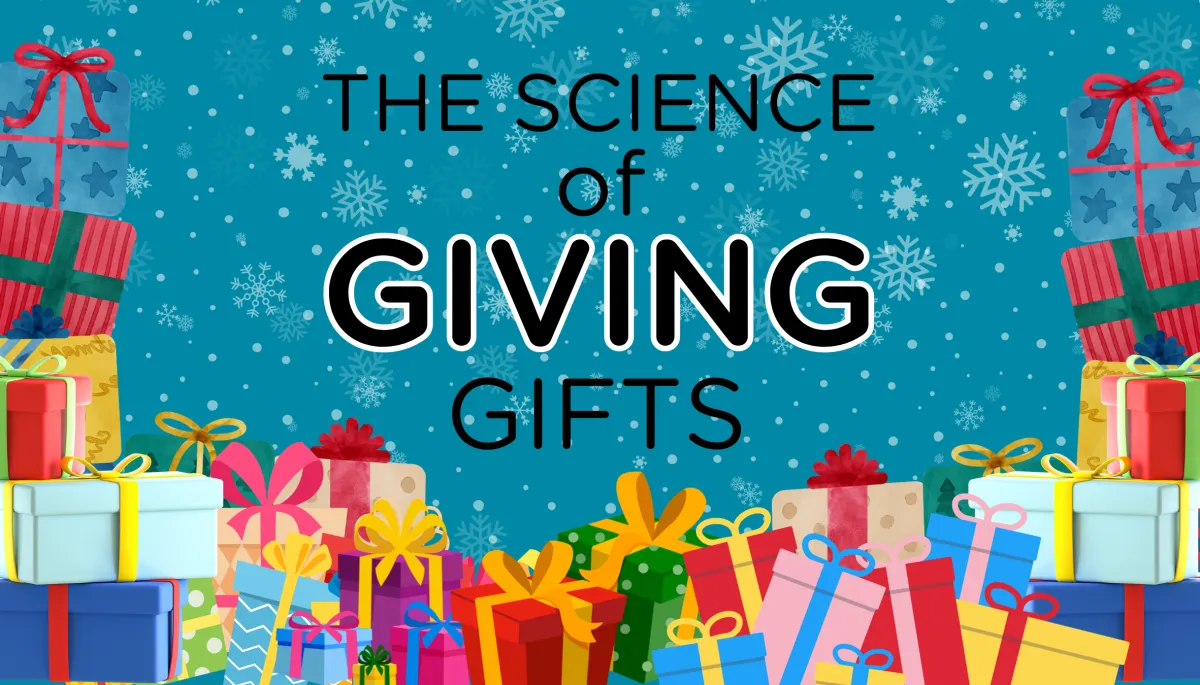General Inquiries: (587) 333-6349 - info@sanostate.com



The Science of Giving Gifts
“- the time and consideration about a gift itself is part of the process... we hope you HAVE FUN!” - Blake Ausmus
‘Tis the season for gift-giving! We all know that there are many reasons to give gifts. Gift-giving and gift-receiving can both be very stressful. So, here are some considerations based on science.
Give without expectations
Gift to thank for the past rather than the future. Research found that gifts given without any expectation led to improved performance over a period of six weeks. However, such improvements were not seen when the gift came with expectations. So, making it clear that a gift is obligation-free is the way to go. Simply saying, “I just saw this and thought of you,” or “this is for all of your hard work over the last few months,” can take away the notion of any future expectations.
Consider when a gift might be appropriate
Sometimes, a gift might not be appropriate. A recent study found that a gift to a physician led to improved bedside manner and overall better care for the gift-giver. However, if it leads to more time spent on one patient, it could come at the cost of others who might need the physician’s extra time and care. In such cases, a card might be more appropriate. In another scenario, should you give your daughter’s teacher a gift just as she is about to grade some homework? This makes a gift for a teacher at the end of the school year more appropriate than a holiday gift given in December.
Give for more than just a reaction
When purchasing a gift, we often imagine the moment when the gift will be received. We conjure images in our head of them laughing out loud, smiling big, or possibly tearing up at the surprise of the gift. However, research shows that we tend to hyper-focus on the emotion connected to opening the gift and overlook the overall satisfaction. Sure, a stuffed gorilla in a cage singing “Born to Be Wild” can be funny at that moment but might not provide any value to the receiver after that initial laugh. Try to think beyond the moment of the gift opening if you want it to carry some more significance.
Gift-exchange games
Gifts given out of obligation are likely to be less rewarding for both the giver and the receiver. Maybe there’s a way to offset these obligations. Instead of swapping gifts year after year of something your friend might not even like, wouldn’t spending the money on yourselves in these situations make more sense? Perhaps go and spend that money on something you would enjoy doing together? Gift exchanges can be particularly frustrating when there is an obligation to buy several gifts for a group of people. A simple solution is implementing a game like a White Elephant gift exchange or Secret Santa. This makes for a shared event that will probably be better for overall enjoyment and memory-making than the gifts themselves. (Not sure what a White Elephant gift exchange is, check out the official website to LEARN MORE)
Consider the stress of receiving a gift
For so many, giving feels so good that we don’t consider how it can affect the other person. Receiving a gift can cause a lot of stress, especially when that person is not prepared to reciprocate. Thoughts might include, “Oh no, they’re watching me intensely; I have to act like I love this no matter what,” or “I am so embarrassed, I didn’t think to get them anything.” Research shows that we greatly underestimate how anxiety-provoking it can be for someone to receive a gift. Communicating beforehand by saying, “I got a small gift for you. I’ll bring it on Sunday when I see you next” can help with preparedness. Or make it very clear, “Look, I don’t expect anything in return but wanted to get you something because you’ve been so helpful shovelling my sidewalk.” Conversely, I recommend having a generic gift, like a box of chocolates, wrapped up and ready for any unexpected gift-giver that might stop by your home. 😉
Gift Competition

Like it or not, this happens all the time! This is where two or more people are each giving the same person a gift. When a child receives a gift from each set of grandparents, comparisons will likely happen. Research says that this leads to the mindset of valuing which one is better rather than both as being good. Look out for potential gift competitions and organize around them if you can. Can you give them your gift at a different time, or insist they wait until Christmas to open it?
Best. Gift. Ever
If you are looking to give “the best gift ever” to someone, statistically speaking, it is most likely that said gift will be an experience rather than an item, gift card, or money. Experiences as gifts are more commonly given to people that we are close to. This is because it’s often a more intimate gift that displays an understanding of the receiver’s likes and dislikes. If you are taking them to a concert, just give them one ticket so it is clear that you’re going together. If you give them two tickets, avoid the confusion of whether you anticipate being involved by communicating it. You could say, “I got you two tickets so you can take your wife,” or “I’ll be out of town then, but you have a good time!”
Worst. Gift. Ever.
In the event of a failed gift, the receiver typically has three coping strategies that can be implemented. Concealing is often done to try to preserve the relationship or spare the hurt feelings of the giver. Confronting is a way to help correct or improve the gift in a practical way. And re-framing usually shifts the emphasis from the gift to the relationship with the giver. When giving a gift, writing a simple message on the tag, such as, “to my closest friend who got me through the loss of my dog,” helps people focus more on the relationship and place less value on what the gift actually is, reducing the potentially awkward moment of a failed gift.
Conclusion
These are just some considerations as we approach Christmas. There is much more to it than we are even aware of sometimes, so hopefully, this gives you a little food for thought. Remember, the time and consideration about a gift itself is part of the process, as well as when and how to give it and the long-term satisfaction or joy it might bring. We hope you HAVE FUN with gift-giving and receiving this holiday season!
This can be a challenging time of year, if you can use support click HERE to connect or call 587-333-6349. 💙
References
Branco-Illodo, I., & Heath, T. (2020). The ‘perfect gift’ and the ‘best gift ever’: An integrative framework for truly special gifts. Journal of Business Research, 120, 418–424. https://doi.org/10.1016/j.jbusres.2019.11.012
Branco-Illodo, I., Heath, T., & Tynan, C. (2020). “You really shouldn’t have!” Coping with failed gift experiences. European Journal of Marketing, 54(4), 857–883. https://doi.org/10.1108/EJM-05-2018-0309
Brock, J. M., Lange, A., & Leonard, K. L. (2018). Giving and promising gifts: Experimental evidence on reciprocity from the field. Journal of Health Economics, 58, 188–201. https://doi.org/10.1016/j.jhealeco.2018.02.007
Chen, Z., Lin, W., & Meng, J. (2022). Does gift competition hurt? An experimental study of multilateral gift exchange. Journal of Economic Behavior & Organization, 201, 260–275. https://doi.org/10.1016/j.jebo.2022.07.022
Cheng, A., Meloy, M. G., & Polman, E. (2021). Picking Gifts for Picky People. Journal of Retailing, 97(2), 191–206. https://doi.org/10.1016/j.jretai.2020.07.003
Givi, J. (2021). When a gift exchange isn’t an exchange: Why gift givers underestimate how uncomfortable recipients feel receiving a gift without reciprocating. Journal of Business Research, 129, 393–405. https://doi.org/10.1016/j.jbusres.2021.03.013
Peng, L., Wang, Y., & Chen, J. (2020). Consequences of Gift Giving in Online Health Communities on Physician Service Quality: Empirical Text Mining Study. Journal of Medical Internet Research, 22(7), e18569. https://doi.org/10.2196/18569
Sunwolf. (2006). Gift-Receiving: “It’s just what I wanted!” [Not.]. Communication Research Trends, 25(3), 12–14.
Ward, M. K., & Broniarczyk, S. M. (2013). It’s Not Me, It’s You: How Gift Giving Creates Giver Identity Threat as a Function of Social Closeness. Journal of Consumer Research, S270–S287. https://doi.org/10.1086/658166
Yang, A. X., & Urminsky, O. (2018). The Smile-Seeking Hypothesis: How Immediate Affective Reactions Motivate and Reward Gift Giving. Psychological Science, 29(8), 1221–1233. https://doi.org/10.1177/0956797618761373
Disclaimer
Our content is for informational and educational purposes and is not a replacement for professional advice, diagnosis, or treatment. If you're facing mental health concerns, please seek help from a qualified professional for personalized guidance is vital. Every individual's situation is unique, so use the information here at your discretion. While we strive for accuracy, the field of psychology is ever-evolving, and our content may not always reflect the latest research. Please prioritize your privacy by avoiding sharing personal information in comments or interactions. Your well-being is our top concern, so use our content for educational purposes, but remember to rely on professionals for your specific needs.
General Inquiries:
Our Locations:
Additional Resources:
About Us:
We strive for excellence in psychological treatment. We are committed to providing professional, caring, innovative, and research-based services.
© 2024 Sano State Taylored Psychology. All Rights Reserved.


